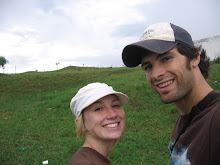 Though John Lennon is often portrayed as the leader of the Beatles, Geoff Emerick, observant author of Here, There, and Everywhere: My Life Recording with the Beatles would suggest otherwise. Lennon was the outspoken "cheeky" rebel who stole the show whenever there was one to be stolen, but McCartney seemed to be the amiable, confident, kind leader who could calm Lennon down whenever he got out of control. Paul was the baby-faced Beatle that everyone loved because he had a good heart and a good voice.
Though John Lennon is often portrayed as the leader of the Beatles, Geoff Emerick, observant author of Here, There, and Everywhere: My Life Recording with the Beatles would suggest otherwise. Lennon was the outspoken "cheeky" rebel who stole the show whenever there was one to be stolen, but McCartney seemed to be the amiable, confident, kind leader who could calm Lennon down whenever he got out of control. Paul was the baby-faced Beatle that everyone loved because he had a good heart and a good voice.Paul was very into drugs in his early years. It is said that when the band stayed up late to write and record their songs, they were given "prellies" (Preludin) to aid them in keeping their energy high. It is said that Paul took one and John would take five. Anyway, this led to Paul's heavy usage of cannabis (which was introduced to him and the Beatles by Bob Dylan). It can be noted that many of Paul's songs contain references to marijuana. His song "Got to Get You Into My Life" sounds like a song about a girl, but he's really singing about weed. In 1967 he and some other smokers paid for an ad in the Times Magazine that asked for the legalization of marijuana.
Paul had quite a strange marriage. He met Jane Asher in 1963 and convinced her to become his girlfriend later that same year. He and John practiced many of their songs at the Asher's household. In fact, the world's most covered song (Yesterday) was written there. They had a strong relationship for the next for years. Then things would become strained.
In May of 1967 Paul met photographer Linda Eastman while she was shooting a project on the bands of the "swinging sixties". After a date, she finished her project and went back to New York.
But things with Asher went on as planned. In December of '67 they were engaged. When the Beatles when on their trip to India in '68, Asher accompanied Paul. One day Asher came back from Bristol and found Paul in bed with another woman. She ended the relationship and though attempts were made later in the year to mend it, they parted for good.
May of that year Paul ran into Eastman again while he and Lennon were in New York. She flew back with him to London. They got married less than a year later in March of '69 when Eastman was four months pregnant with their first child.
When McCartney was at the top of the world during the Beatlemania years, he too had the realization that there was more to live for. As a musician, he realized that the music that he made, though great, couldn't really change the world. His success wasn't enough for him-- he felt the need to do something that he felt had purpose. Where did he turn? To an unlikely place.
Paul McCartney is an outspoken vegetarian and animal rights activist. Many of his concerts are for raising money to support animal rights groups. In fact, in the year 1999 McCartney paid around 3 million pounds to make sure that his wife's food was free from GM (Genetically Engineered) ingredients. Paul wants to do something to change the world for the better. So why is he choosing try to help animals??
I'll be honest, I like Paul McCartney. I'm still trying to decide whether I like him or Ringo more. The truth is, though, is that McCartney's values are all skewed. The truth is that whatever it is he accomplishes for the animal kingdom will burn. Everything that he has ever accomplished has no meaning unless in has in some way furthered God's kingdom. Sadly, it seems as though Paul has rejected the kingdom of the Almighty for a kingdom of animals.


